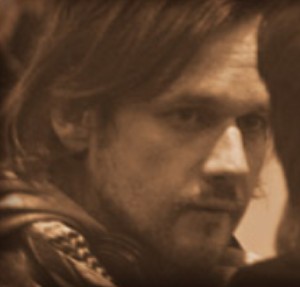An Evening with Peter Rollins
28/09/13 05:35

Although I don’t think that Rollins would describe himself as a part of the emerging church, he is certainly a darling of the emerging church movement. Many who are engaged in redefining the church and seeking new ways to live out their faith in settings that are less focused on building institutions have found Rollins work to be helpful in understanding and explaining their enterprise.
With his Irish accent and bright mind, Rollins is an engaging storyteller and easy to listen to as he weaves a bit of classical theology, a touch of bible reflection and personal experiences together.
I don’t mean to sound judgmental, but my reaction to the evening was a bit of disappointment. I think I had expected to learn something new, but for the most part the ideas that were shared were not new to me. While they might have sounded radical to some adherents of Christianity’s fundamentalist corner, I’m not sure that there were any of those folks in the gathering last night. As an academic, I’m relatively sure that Rollins knows where he stands in the long line of theologians and philosophers of religion, but most members of the audience last night were not academic theologians. I’m sure Rollins’ ideas were new to some of them.
It was an interesting crowd. I expected that I would be the oldster in a group of 30-somethings. But the crowd was almost as grey haired as our congregation when we gather on Sundays. The difference was that the hair was probably longer. There were a number of people who I might describe as aging hippies. They have an interest in counter-cultural happenings and aren’t likely to show up for mainline religious functions. They appreciated Rollins’ criticism of the institutional church.
As is often the case, I heard his criticism, but the institution he was criticizing bears little or no resemblance to the institution I serve, where I live and practice my faith. The one identifiable element in his portrait of the institutional church that I did recognize is music. We are a place of predominantly classical music. Although we probably have more musical diversity than a congregation that is strictly praise band or a smaller gathering that has access to only a few musicians, we do have a dominant genre to our worship music.
But our church isn’t a place that frowns on the expression of doubt. Our church isn’t a place that insists on conformity or consistency of belief. We do not require participants to agree on theology or interpretation of scripture. We make no claim to being possessors of the Truth. We are not focused on self-preservation or institutional survival only. We do not push away those who disagree. We have not forgotten Christ’s call to humble service of those at the margins of society.
Based on last night’s gathering, which probably isn’t typical, I would say that the every Sunday gathering of our congregation represents more diversity of thought and belief than the audiences that are drawn to hear Peter Rollins speak.
Rollins way of using classical theologians and thinkers such as Bonheoffer and Kierkegaard to provide a way of thinking about faith that does not claim exclusivity or certainty was somewhat new to me in my college years. But last night’s talk would have not have been considered radical or filled with new ideas to the people with whom I studied at seminary 35 to 40 years ago.
I might describe Rollins as an existentialist theologian who hasn’t yet caught up with liberation theology. That was a common way of thinking in the 1960’s and 1970’s, but there have been a lot of discussions held and books written since those days.
I don’t know what I expected from the evening. It was a pleasant gathering with friends in a comfortable atmosphere with a good speaker and good music. And the evening might have gone differently if I had taken the time to engage Rollins on some of the themes of mission, service, sacrifice and justice that come from Central American liberation theology of the end of the 20th century. It would be interesting to have time to show him our church and the ways in which we have restructured ourselves to be more responsive to emerging ministries and grass roots mission. I suspect that we would enjoy each other as thinkers and appreciate each other’s ideas.
But on a tired Friday evening after a long week filled with 12 and 14 hour days, I found myself wanting something that I could identify as a new idea or a fresh thought.
There was a huge emphasis on ecumenical cooperation in the 1960’s and ‘70’s. My mother participated in many such gatherings and conversations, especially around the area of Christian education. I remember that she used to come home from those meetings a bit disappointed. On more than one occasion she would ask, “Why do we have to go backwards and re-live the last 25 years in order to find common ground.” Sometimes I have a similar feeling when I hang out with some of my more fundamentalist friends. They are beginning to discover theological themes that were new to me decades ago, but my thinking has evolved in the intervening time. Sometimes it feels as if I have to go backwards in order to have a conversation with them.
Still it is a good enterprise to engage ideas with people who are different from me. It is good to look at myself through the eyes of people with a different perspective. I am grateful for the warm hospitality of our hosts and their passion for ideas. And I’m glad I got to hear Peter Rollins speak. His passion for the life of the mind is refreshing.
I just wish he would inspire a vision of the future instead of reminding me what I was like at his age.